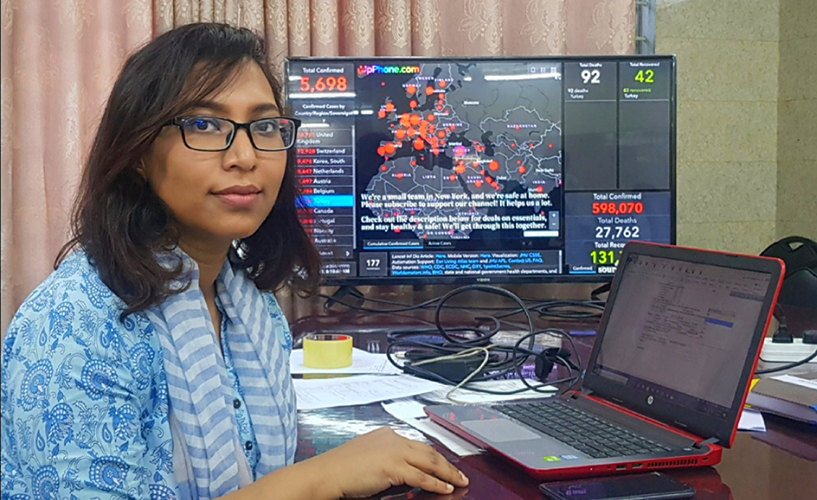Fighting COVID-19 from Bangladesh’s Control Room
Fighting COVID-19 from Bangladesh’s Control Room

Raian Amzad, a technical advisor with the DFID-funded Better Health in Bangladesh (BHB) project, and her colleagues took time away from their regular work to help Bangladesh’s central response to COVID-19. Here’s how the project and the country are handling the pandemic threat.
Can you tell me about your recent work assignment related to COVID-19? What did your typical day look like?
On March 17, the Directorate General of Health Services opened a temporary Integrated Control Room for COVID-19 response. Fifteen different groups are working there. I was in one with other developmental partners.
The control room guides, supervises, and monitors the entire country in responding to COVID-19; facilitating meetings with donors; disseminating awareness messages and myth busters for the public; developing guidelines for the health workforce; and coordinating logistics, commodities, and media outreach. I have been engaged in all sorts of tasks, and it was enlightening to work so closely with the government health system.
How is the program’s work helping Bangladesh contain the virus?
Four BHB technical advisors and one administrative assistant are providing full-time support to the COVID-19 control room. We are procuring personal protective equipment (PPE) for doctors and other health workers, disinfectants, and disposal bags for burials. We are posting COVID-19 awareness messages on the project’s Facebook page. We are also providing transportation for people collecting samples and delivering them to testing laboratories while maintaining hygiene and safety protocols.
And the country overall? What are its strengths? What are its challenges?
The government has closed schools and workplaces and is mandating social distancing. This includes encouraging people to pray inside homes, not in mosques. One of our biggest national events, the first day of the Bengali new year celebration, was called off. Law enforcement agencies are ensuring we follow the rules.
Bangladesh is famous for our garment and pharmaceutical industries. Companies from these sectors are proactively supporting the government to produce PPE locally and are donating medicines. Other businesses are building 2,000-bed hospitals especially for COVID-19 patients.
Staying home might sound like a simple appeal. However, the majority of our population are day laborers who are illiterate or have limited education. They have a hard time understanding quarantine rules and the reasons for social distancing. This population is also the most vulnerable, and their needs for food and shelter have been barely addressed. Sadly, as much as they are vulnerable, they also contribute to spreading the virus.
What is the mood of health workers there?
At first, the scarcity of necessary PPE put the health workers in crisis. They refused to handle symptomatic patients without it and had to face harsh criticism from the public. However, as we are in the third week of this pandemic and PPE is starting to become available in limited quantities, doctors and other health workers are coming forward to save lives.
And people in general?
I find it problematic that in this global crisis, where personal hygiene and social distancing can save lives, people are more interested in attacking the government response, usually without knowing the facts. On the other hand, people are appreciating health care workers and are making better choices, such as staying home.
Unfortunately, there are many myths flying around. For example, because Bangladesh has so much air pollution, people are saying that we are particularly resilient and our natural immunity is stronger than in any other country. Or that because of our warm weather, the virus will be less virulent. Or that as we are a religious nation, the virus will not kill us, but that we should pray five times daily—at the mosque—just in case. And so forth.
What are you and your family doing to stay safe?
I am the only one in my family going out every day. I use masks and hand sanitizer and do grocery shopping as needed on my way back home so that no one else needs to go out. Upon my return, I immediately change my dress and take a shower. I disinfect my hand bag. We are also cleaning surfaces and wiping door knobs with Clorox. With all the time spent bonding at home, we have trained our five-year-old daughter to do these things, too.
Interviewed by Stacy Lu